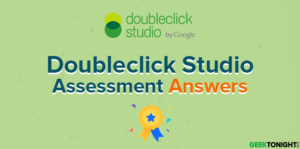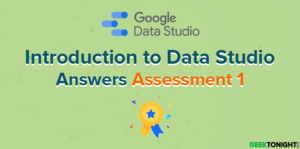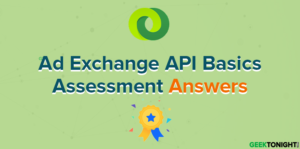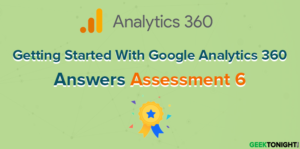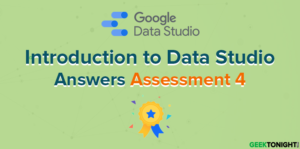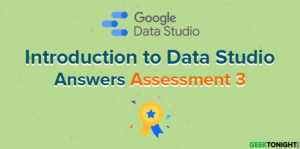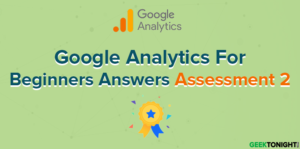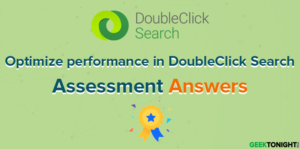Exam: https://cloud.google.com/certification
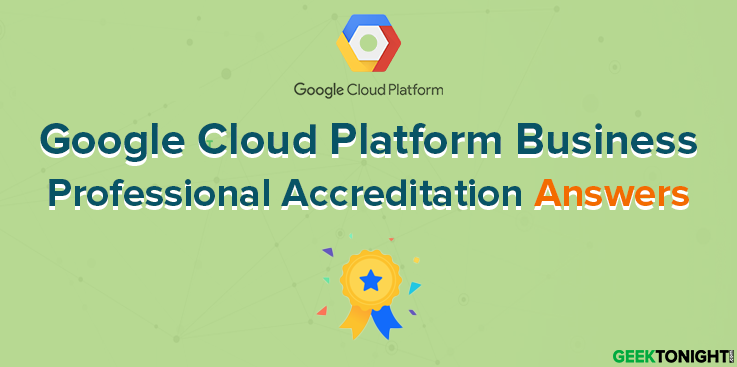
Table of Content
- 1 Part 1. Assessment: GCP Compute
- 1.1 Which of these key terms indicate a business-related challenge that App Engine addresses?
- 1.2 As a computing platform provided as a service, how does App Engine provide value?
- 1.3 Which product included in Google Cloud networking serves content to end users with high availability and high performance?
- 1.4 Compute Engine is ideal for organizations that:
- 1.5 What business value can Firebase provide?
- 1.6 Organizations can build apps that run on Kubernetes Engine that: (Select the 2 correct answers)
- 1.7 What challenges are addressed by Google Cloud networking?
- 1.8 How does Cloud Functions connect and extend cloud services?
- 1.9 What is a software container?
- 1.10 Which statement best describes where Google Cloud networking fits within GCP?
- 1.11 Which of these statements best expresses what you can do with Cloud Functions?
- 1.12 Which of the following best defines Compute Engine?
- 1.13 What business value can Compute Engine provide?
- 1.14 Mobile app teams can integrate their mobile apps with one of the available _ and manage the integrated Firebase services via ____ which includes tools from Google for developing apps, engaging with users, and earning more through mobile ads.
- 1.15 What business value can Kubernetes Engine provide?
- 1.16 Firebase helps mobile application development teams:
- 1.17 Which product included in Google Cloud networking allows organizations to connect GCP resources in a separate network or domain and isolate them from each other for security and compliance?
- 1.18 How does Compute Engine provide the same computing power that Google uses for its infrastructure?
- 1.19 Which of these is an example of a challenge addressed by Cloud Functions?
- 1.20 Compared to Compute Engine and App Engine, what type of solution is Kubernetes Engine?
- 1.21 What is Kubernetes Engine?
- 1.22 What are some challenges that Firebase addresses? Select the 2 correct answers.
- 1.23 Which of the following is a benefit provided by Cloud Functions?
- 1.24 What is the definition of a “network” in relation to GCP?
- 1.25 Of the four GCP options that are aligned with where the code needs to run, App Engine is:
- 1.26 What service do organizations receive with App Engine that meets key developer needs?
- 1.27 How does Compute Engine improve quality and time to market?
- 1.28 During the app building process, which of these challenges are relieved by App Engine that organizations would have previously had to do on their own? Select the 3 correct answers.
- 1.29 Developer agility comes from building systems composed of small, independent units of functionality focused on doing one thing well, so how does Cloud Functions help improve developer agility?
- 1.30 Firebase is GCP’s mobile extension. Several of Firebase’s products are built on top of GCP products, providing mobile-optimized SDKs and capabilities. Which of these products can be amplified via Firebase?
- 2 Part 2. Assessment: GCP Storage and Databases
- 2.1 Organizations considering Cloud Spanner often find ACID transactions valuable. What are ACID transactions?
- 2.2 Which statement best aligns with the role Cloud Spanner plays in GCP?
- 2.3 Related to ease of use, organizations can focus on their app, not their infrastructure, because Cloud Spanner:
- 2.4 How does Cloud SQL address the challenge of compatibility?
- 2.5 Cloud Spanner is:
- 2.6 Considering where it fits in the GCP, Cloud Datastore is good for:
- 2.7 With Cloud Spanner, if one region goes offline, data can still be served from another region. How does Cloud Spanner make this possible?
- 2.8 “High availability and durability via replications is just there: you don’t need to think about it or manage it. No scheduled downtime for upgrades, resizing or configuration changes.” Which of the following concerns is addressed by this Cloud Datastore value proposition?
- 2.9 What is a data transfer option offered by Google to help move data?
- 2.10 What are some common challenges that can be addressed by data transfer options?
- 2.11 Cloud Firestore is:
- 2.12 Connecting to Cloud SQL databases looks the same as connecting to a MySQL or PostgreSQL database by using:
- 2.13 With Cloud Bigtable, organizations can accelerate time to market for their data-intensive applications, enable seamless, ____, reduce operational overhead, and improve business operations.
- 2.14 What aspect of Cloud Datastore allows organizations to worry less about making changes to their underlying data structure as their application evolves?
- 2.15 What is an example of a time-consuming task required to set up and run a database that organizations can hand off to Google when they choose to use Cloud SQL?
- 2.16 How does Cloud Storage deliver simplicity?
- 2.17 How does Cloud Storage help organizations get content to their users faster?
- 2.18 How does BigQuery Data Transfer Service work?
- 2.19 What is Cloud Bigtable NOT good for?
- 2.20 Cloud Storage _ object (or BLOB) data. Organizations can store an unlimited number of objects, up to 5 in size each.
- 2.21 “Cloud Datastore enables you to hand off the responsibility of running a highly scalable document-oriented database to Google. From 10 users to 100s of millions of users, you will no longer need to spend time optimizing, configuring the database, updating it, or monitoring system health.” Which of the following concerns is addressed by this Cloud Datastore value proposition?
- 2.22 Using your understanding of GCP options/products meant to address storage and database areas, which statement best aligns with where Cloud Bigtable fits within GCP?
- 2.23 “High availability and durability via replications is just there; you don’t need to think about it or manage it. No scheduled downtime for upgrades, resizing or configuration changes.” Which of the following concerns is addressed by this Cloud Firestore value proposition?
- 2.24 Which of these statements about Cloud Datastore is FALSE?
- 2.25 What type of database is Cloud SQL?
- 2.26 Why is Cloud Bigtable great for IoT and user analytics?
- 2.27 Which of the following describes Cloud Firestore’s business value?
- 2.28 Which statement best defines where data transfers fit within the GCP?
- 2.29 Cloud Storage is good for:
- 2.30 With Cloud Firestore, you no longer need to determine the number of nodes or add servers or storage because:
- 2.31 Which Cloud Storage class is meant for organizations with the lowest frequency access?
- 2.32 Cloud Firestore is good for:
- 2.33 What business challenges does Cloud Bigtable address? Select the 2 correct answers.
- 2.34 What is a common use case for moving data to GCP? Select the 2 correct answers.
- 2.35 What is Cloud SQL?
- 3 Part 3. Assessment: GCP Big Data and Machine Learning
- 3.1 Which of these statements best describes the kinds of transforms a Cloud Dataflow pipeline can do?
- 3.2 BigQuery can bring in other Google products because within the common big data processing model, BigQuery is found in the __ phases.
- 3.3 What is the business value that Cloud Pub/Sub can provide?
- 3.4 Which challenge is Cloud IoT designed to address?
- 3.5 Likened to a connector, which description best aligns to Cloud Pub/Sub’s role in GCP?
- 3.6 BigQuery has the ability to scale seamlessly; what is another benefit when it comes to infrastructure?
- 3.7 Within the big data processing model, which description defines where Cloud Pub/Sub falls and the role it plays?
- 3.8 What is the value that Cloud Dataflow can provide?
- 3.9 Which of these benefits correspond to business challenges that are addressed by Cloud IoT?
- 3.10 What business value can BigQuery provide?
- 3.11 For organizations that want a large-scale machine learning service, select the value ML provides.
- 3.12 How is BigQuery ideal for organizations that run a data warehouse?
- 3.13 What business challenges does Cloud IoT address? Select the 3 correct answers.
- 3.14 Cloud Dataflow is a fully managed service for transforming and enriching data in stream (real time) and batch (historical) modes with equal reliability and expressiveness. Knowing this, where does Cloud Dataflow fit in the big data processing model?
- 3.15 Cloud Dataflow is a tool for developing and executing a wide range of data processing patterns on very large datasets. Which of these examples aligns with what Cloud Dataflow can do?
- 3.16 Google Cloud’s AI provides modern machine learning services, with models and a service to generate your own __ models.
- 3.17 What does Cloud Dataproc do to help organizations avoid expensive underutilized clusters?
- 3.18 What are some business challenges that Cloud Dataproc addresses?
- 3.19 How does Cloud IoT help organizations unlock business insights in real time from data across globally dispersed devices?
- 3.20 Cloud IoT is a set of fully managed and integrated services that allows organizations to easily and securely connect, manage, and collect data from devices across the globe at a large scale. Knowing this, what stage of big data processing does Cloud IoT belong in?
- 3.21 A query is how you retrieve information from a database, so which of these paths demonstrates the journey of a query?
- 3.22 Which of these statements best expresses what you can do with Cloud Dataflow?
- 3.23 The Cloud Dataproc approach allows organizations to use Hadoop/Spark/Hive/Pig when needed. It takes on average only 90 seconds between the moment resources are requested and a job can be submitted. What makes this possible?
- 3.24 What dataset type is vital to machine learning?
- 3.25 Machine learning is a branch of computer science that:
- 3.26 An organization’s analysts use Spark Shell. However, their IT department is concerned about the increase in usage and how to scale their cluster, which is running in Standalone mode. How does Cloud Dataproc help?
- 3.27 What is the value that Cloud Pub/Sub provides? Select the 2 correct answers.
- 3.28 Which of these statements about the Publisher-Subscriber pattern utilized by Cloud Pub/Sub is TRUE?
- 3.29 Which of the following is one of Google’s machine-learning-as-a-service offerings?
Part 1. Assessment: GCP Compute
- patching zero-day exploits
- testing datasets for machine learning
- time to market
- control of virtual machines
As a computing platform provided as a service, how does App Engine provide value?
- App Engine deploys and maintains a fleet of VMs that enable organizations to create containerized workloads.
- App Engine saves organizations time and cost in software application development by eliminating the need to buy, build, and operate computing hardware and other infrastructure.
- App Engine routes packets across the globe and stores data at the edge of the network closest to the user so that the organization’s data is where their users need it.
- App Engine allows organizations to manage a server or runtime environment.
Which product included in Google Cloud networking serves content to end users with high availability and high performance?
- Cloud DNS
- Virtual Private Cloud
- Cloud CDN
- Cloud Interconnect
Compute Engine is ideal for organizations that:
- Need complete control over the virtual-machine infrastructure.
- Need a fully managed database service.
- Don’t want to touch a server or infrastructure.
- Need to connect and extend cloud services.
What business value can Firebase provide?
- Edeveloper productivity
- SDKs and consoles available
- saving time and cost
- ease of use
Organizations can build apps that run on Kubernetes Engine that: (Select the 2 correct answers)
- MoCan connect to and extend cloud services.
- Will scale up to handle massive computing loads quickly and efficiently.
- Have high availability without a complex architecture.
- Are highly secure and reliable and backed by Google’s service level agreement.
What challenges are addressed by Google Cloud networking?
- Worldwide autoscaling and load balancing
- Content delivery network
- Monitor app stability and performance
- More rapid application development
How does Cloud Functions connect and extend cloud services?
- It provides a layer of logic so that organizations can write code to access other services.
- It removes unnecessary data from a container.
- It patches operating systems.
- It adds files to a storage system.
What is a software container?
- A container imitates a computer.
- A container answers queries of very large datasets.
- A container is a fully managed database service.
- A container makes it easier for teams to package, manage, and ship their code.
Which statement best describes where Google Cloud networking fits within GCP?
- Organizations benefit from Google’s superb networking.
- Google Cloud networking only operates outside of GCP.
- For the past 15 years, GCP has been building out a fast, powerful, high quality cloud infrastructure.
- When every millisecond of latency counts, Google Cloud networking ensures that content is delivered with high throughput.
Which of these statements best expresses what you can do with Cloud Functions?
- “With Cloud Functions, I can write simple, single-purpose functions that are attached to events emitted from my cloud infrastructure and services.”
- “Thanks to Cloud Functions, I finally have a platform to build my apps, allowing me to focus on fine-tuning the customer experience rather than on maintaining my infrastructure.”
- “I now have practically unlimited computing power by using virtual machines (VMs) through Cloud Functions.”
- “Cloud Functions saves me time and money in software application development by eliminating the need to buy, build, and operate computing hardware and other infrastructure.”
Which of the following best defines Compute Engine?
- Compute Engine provides practically unlimited computing power using virtual machines (VMs) in the cloud.
- Compute Engine is a type of software-as-a-service (SaaS).
- Compute Engine provides innovative storage solutions using an open source container-orchestration system.
- Compute Engine is a computing platform provided as a service, called a “platform-as-a-service” (PaaS).
What business value can Compute Engine provide?
- Compute Engine provides better kernel-level control and encryption.
- Compute Engine automates with event-driven functions that respond to cloud events.
- Compute Engine makes it easy to create and configure high-performance VMs that will quickly and easily scale to any size workload.
- Compute Engine stores and serves object (or BLOB) data.
Mobile app teams can integrate their mobile apps with one of the available _ and manage the integrated Firebase services via ____ which includes tools from Google for developing apps, engaging with users, and earning more through mobile ads.
- containers, Docker
- VMs (virtual machines), App Engine
- SDKs (software development kits), the console
- data kits, the interface
What business value can Kubernetes Engine provide?
- Scaling without downtime.
- Seamlessly migrate code from development to production.
- Improve application reliability through integrated health checking.
- Maximize resource utilization.
Firebase helps mobile application development teams:
- Develop faster and easier with cloud backend services.
- Eliminate the need to buy, build, and operate computing hardware.
- Transfer data from on-premises to the cloud.
- Route packets across the globe and store data closest to the user.
Which product included in Google Cloud networking allows organizations to connect GCP resources in a separate network or domain and isolate them from each other for security and compliance?
- Virtual Private Cloud
- Cloud CDN
- Cloud Interconnect
- Cloud DNS
How does Compute Engine provide the same computing power that Google uses for its infrastructure?
- By focusing on writing code and not touching a server, cluster, or infrastructure.
- By reducing costs.
- By improving quality and time to market.
- By using virtual machines (VMs) in the cloud.
Which of these is an example of a challenge addressed by Cloud Functions?
- Big data complexity
- Insufficient storage
- Development agility
- App infrastructure
Compared to Compute Engine and App Engine, what type of solution is Kubernetes Engine?
- Serverless Logic
- IaaS
- PaaS
- Hybrid
What is Kubernetes Engine?
- Kubernetes Engine provides practically unlimited computing power using virtual machines (VMs) in the cloud.
- Kubernetes Engine is a solution meant to help organizations achieve zero ops.
- Kubernetes Engine is built on the closed-source Kubernetes system, making it easy to orchestrate container clusters or groups of containers.
- Kubernetes Engine is a managed environment for deploying containerized apps.
What are some challenges that Firebase addresses? Select the 2 correct answers.
- Monitor app stability and performance
- Content delivery network
- More rapid application development
- Worldwide autoscaling and load balancing
Which of the following is a benefit provided by Cloud Functions?
- Relational database
- User authentication
- Machine learning
- Serverless economics
What is the definition of a “network” in relation to GCP?
- A “network” is an isolated, global resource holding configuration.
- A “network” is an SDK available across most popular mobile platforms.
- A “network” is a container deployed regionally via the cloud.
- A “network” is a series of instances deployed at the global network level.
Of the four GCP options that are aligned with where the code needs to run, App Engine is:
- The infrastructure-centric solution
- The serverless logic solution
- In the middle (cluster)
- The platform-centric solution
What service do organizations receive with App Engine that meets key developer needs?
- User authentication, versioning, and robust security tools like Cloud Security Scanner
- TensorFlow for machine learning models and algorithms
- Messaging service to pass data from gathering and processing systems
- Portability achieved by using Docker and Kubernetes
How does Compute Engine improve quality and time to market?
- Google bills in per-second increments, so you only pay for the compute time you use. With sustained use discounts,
- Google automatically gives discounted prices for long-running workloads with no up-front commitment required.
- Google can capture up to a petabyte of data on one Transfer Appliance without impacting the outbound network.
- Google-grade data centers give you scale and security that would be very expensive to achieve on-premises.
- Google’s global private network is superior in performance to other clouds that route your traffic over the internet.
During the app building process, which of these challenges are relieved by App Engine that organizations would have previously had to do on their own? Select the 3 correct answers.
- Build their own infrastructure.
- Make sure it’s available night and day.
- Control over the virtual-machine infrastructure.
- Grow the app as their computing needs increase.
Developer agility comes from building systems composed of small, independent units of functionality focused on doing one thing well, so how does Cloud Functions help improve developer agility?
- Cloud Functions lets organizations that really value time to market build apps quickly.
- Cloud Functions lets organizations build and deploy services at the level of a single function, not at the level of entire applications, containers, or VMs.
- Cloud Functions lets organizations deploy and maintain a fleet of VMs through a series of containers.
- Cloud Functions lets organizations make changes to the kernel by providing their own network or graphics drivers to squeeze out the last drop of performance.
Firebase is GCP’s mobile extension. Several of Firebase’s products are built on top of GCP products, providing mobile-optimized SDKs and capabilities. Which of these products can be amplified via Firebase?
- Cloud SQL
- Cloud Engine
- Cloud Spanner
- Cloud Storage
Part 2. Assessment: GCP Storage and Databases
Organizations considering Cloud Spanner often find ACID transactions valuable. What are ACID transactions?
- Autonomous, Centralized, Independent, Dependent
- Automatic, Constant Infrastructure, Decentralized
- Analog, Chronological, Intelligent, Database
- Atomic, Consistent, Isolated, Durable
Which statement best aligns with the role Cloud Spanner plays in GCP?
- Cloud Spanner is good for configuring replications and applying updates.
- Cloud Spanner is good for object database management at scale that requires the capacity to process millions of objects in near real time.
- Cloud Spanner is good for binary data such as images, media serving, and backups.
- Cloud Spanner is good for relational database management systems at scale that require high availability and HTAP
- Distributes organizations’ load-balanced resources in single or multiple regions around the globe, close to their users, to help them meet high-availability requirements.
- Eliminates complex database tasks so there is no need to engineer a complex replication or backup infrastructure.
- Reduces network latency, offloads some work from the origin server, and reduces serving costs.
- Provides a layer of logic that organizations can write code in order to access other servicest
How does Cloud SQL address the challenge of compatibility?
- Cloud SQL builds on performance innovations in Compute Engine and persistent disk.
- It’s easy to control with less infrastructure for you to manage and operate.
- If an organization’s app works with MySQL or PostgreSQL, it will work with Cloud SQL.
- You don’t need to reserve Cloud SQL instances ahead of time to get savings, and you pay by the minute, not by the hour.
Cloud Spanner is:
- A managed environment for deploying containerized apps.
- An enterprise-grade, globally distributed, and strongly consistent managed database service built for the cloud specifically to combine the benefits of relational database structure with non-relational horizontal scale.
- A fully managed database service that makes it easy to set up, maintain, manage, and administer relational MySQL and PostgreSQL databases in the cloud.
- A tool for developing and executing a wide range of data processing patterns on very large datasets.
Considering where it fits in the GCP, Cloud Datastore is good for:
- Highly structured databases or transactional databases.
- Organizations with non-relational data that want to reduce their operations burden with an enterprise-grade database.
- Relational database management at scale that requires high availability and HTAP.
- Flat data and databases with lots of read-write actions.
With Cloud Spanner, if one region goes offline, data can still be served from another region. How does Cloud Spanner make this possible?
- Cloud Spanner captures up to a petabyte of data on one Transfer Appliance without impacting the outbound network.
- Cloud Spanner stores and serves an unlimited number of objects and up to 5 terabytes of object data for each.
- Cloud Spanner automates loading data into BigQuery from YouTube, AdWords, and DoubleClick.
- Cloud Spanner uses synchronous replication within and across regions to achieve greater availability.
“High availability and durability via replications is just there: you don’t need to think about it or manage it. No scheduled downtime for upgrades, resizing or configuration changes.” Which of the following concerns is addressed by this Cloud Datastore value proposition?
- Infrastructure costs
- Performance
- Scalability
- Reliability
What is a data transfer option offered by Google to help move data?
- Cloud Engine Transfer Service
- Cloud SQL Transfer Service
- BigQuery Data Transfer Service
- Hardline Transfer
What are some common challenges that can be addressed by data transfer options?
- Manual transfers
- Topline transfers
- Hardline transfers
- Offline transfers
Cloud Firestore is:
- An industry-leading local SDD that integrates with the other products in the Google Cloud Platform suite.
- An enterprise-grade database service built for the cloud specifically to combine the benefits of relational database structure with relational horizontal scale.
- A flexible, scalable NoSQL cloud database to store and sync data for client- and server-side development.
- A tool for developing and executing a wide range of data processing patterns on very large datasets.
Connecting to Cloud SQL databases looks the same as connecting to a MySQL or PostgreSQL database by using:
- Non-traditional transforms and standard tools like Hadoop.
- Standard connectors and standard tools like MySQL workbench.
- Standard containers and standard tools like BigQuery.
- Non-traditional connectors and standard tools like PostgreSQL BETA.
With Cloud Bigtable, organizations can accelerate time to market for their data-intensive applications, enable seamless, ____, reduce operational overhead, and improve business operations.
- availability of SDKs and consoles
- cost configurability
- future proofing
- elastic scaling with zero downtime
What aspect of Cloud Datastore allows organizations to worry less about making changes to their underlying data structure as their application evolves?
- The object-oriented database with containerized applications.
- The schemaless document-oriented database with ACID transactions.
- The relational database with configuration and downtime.
- The warehouse database with a proven production system.
What is an example of a time-consuming task required to set up and run a database that organizations can hand off to Google when they choose to use Cloud SQL?
- Applying patches and updates.
- Migrating data between data centers.
- Developing apps.
- Managing contractors.
How does Cloud Storage deliver simplicity?
- By providing intelligence from data.
- Includes tape libraries and backup capabilities.
- Most reliable service, according to Gartner.
- Single API and millisecond data access latency across storage classes.
How does Cloud Storage help organizations get content to their users faster?
- Standard connectors and standard tools that allow for seamless integrations with existing SQL workflows.
- Regional buckets that enable faster access from storage to compute servers within the region.
- Fully managed relational database services that use edge caching to provide performance.
- Application patches and updates that optimize data processing when it comes to leveraging user data.
How does BigQuery Data Transfer Service work?
- Automates loading data into BigQuery from YouTube, AdWords, and DoubleClick.
- Allows organizations to easily use MapReduce, Pig, Hive, and Spark to process data before storing it, for example, in Cloud Storage or BigQuery.
- Scales up to handle massive computing loads quickly and efficiently.
- Analyzes data to capture insights to be used for more informed decision making.
What is Cloud Bigtable NOT good for?
- It’s not good for highly structured databases or transactional databases.
- It’s not good for very large amounts of data.
- It’s not good for flat data and databases with lots of read-write actions.
- It’s not good for analytical data.
Cloud Storage _ object (or BLOB) data. Organizations can store an unlimited number of objects, up to 5 in size each.
- processes and analyzes, petabytes
- transforms and organizes, zettabytes
- stores and serves, terabytes
- ingests and transfers, gigabytes
“Cloud Datastore enables you to hand off the responsibility of running a highly scalable document-oriented database to Google. From 10 users to 100s of millions of users, you will no longer need to spend time optimizing, configuring the database, updating it, or monitoring system health.” Which of the following concerns is addressed by this Cloud Datastore value proposition?
- Reliability
- Scalability
- Performance
- Infrastructure costs
Using your understanding of GCP options/products meant to address storage and database areas, which statement best aligns with where Cloud Bigtable fits within GCP?
- Cloud Bigtable is a fully managed database service that makes it easy to set up, maintain, manage, and administer relational MySQL and PostgreSQL databases in the cloud.
- Cloud Bigtable is aligned to the non-relational database requirements and is good for heavy read and write, events, and analytical data.
- Cloud Bigtable is good for relational database service management at scale that requires high availability and HTAP.
- Cloud Bigtable helps organizations capture data and rapidly pass massive numbers of messages securely between other Google Cloud Platform big data tools and other software applications.
“High availability and durability via replications is just there; you don’t need to think about it or manage it. No scheduled downtime for upgrades, resizing or configuration changes.” Which of the following concerns is addressed by this Cloud Firestore value proposition?
- Infrastructure costs
- Performance
- Scalability
- Reliability
Which of these statements about Cloud Datastore is FALSE?
- Cloud Datastore is aligned to non-relational database requirements and is good for heavy read and write, events, and analytical data.
- Cloud Datastore is ideal for rapid and flexible web and mobile development.
- Cloud Datastore is a proven production system, serving organizations for 10 years.
- Cloud Datastore is a fully managed NoSQL document database that scales from zero to global scale without configuration or downtime.
What type of database is Cloud SQL?
- Non-relational database
- Warehouse database
- Object database
- Relational database
Why is Cloud Bigtable great for IoT and user analytics?
- Because Cloud Bigtable is a high-performance NoSQL database service for large analytical and operational workloads.
- Because Cloud Bigtable lowers warehousing costs and augments existing warehouses.
- Because Cloud Bigtable scales up to handle massive computing loads quickly and efficiently.
- Because Cloud Bigtable is a fully managed database service that makes it easy to set up, maintain, manage, and administer relational MySQL and PostgreSQL databases in the cloud.
Which of the following describes Cloud Firestore’s business value?
- Cloud Firestore provides daily results for queries to show the changing data.
- Cloud Firestore provides multi-document ACID transactions for SQL databases.
- Cloud Firestore helps you schedule downtime for upgrades, resizing, or configuration changes.
- Cloud Firestore takes care of scalability and operations for running document-oriented databases.
Which statement best defines where data transfers fit within the GCP?
- Data transfer options reduce risk by providing a better understanding of what is happening to allow for greater visibility.
- Data transfer options lead to many other GCP products and solutions that fit an organization’s needs.
- Data transfer options lower warehousing costs and augment existing warehouses.
- Data transfer options run clusters ephemerally; in other words, only when needed.
Cloud Storage is good for:
- Testing data that’s used to validate data sets.
- Training data that’s used in machine learning.
- Tertiary data such as website traffic, clicks, and returning page visitors.
- Binary data such as images, media serving, and backups.
With Cloud Firestore, you no longer need to determine the number of nodes or add servers or storage because:
- It’s a fully managed compute service.
- It’s a database service that allows complete control.
- It’s a database service that uses SQL.
- It’s a fully managed database service.
Which Cloud Storage class is meant for organizations with the lowest frequency access?
- Nearline
- Multi-Regional
- Coldline
- Regional
Cloud Firestore is good for:
- Developing mobile and web applications and reducing operational burden with an enterprise-grade database.
- Organizations that need to store binary data such as images, media serving, and backups.
- Organizations that are using relational databases at scale and need to store user metadata.
- Training and testing data that’s used in machine learning to validate data sets.
What business challenges does Cloud Bigtable address? Select the 2 correct answers.
- Access from storage to compute servers within the region
- Scaling without downtime
- Time to market for data-intensive applicant
What is a common use case for moving data to GCP? Select the 2 correct answers.
- Virtual Private Cloud
- Data center migration
- Preferred locations
- Decommission tape libraries and infrastructure
What is Cloud SQL?
- Cloud SQL helps organizations capture data and rapidly pass massive amounts of messages securely between other Google Cloud Platform big data tools and other software applications.
- Compute SQL offers industry-leading local SSD performance and integrates with the other products in the Google Cloud Platform suite.
- Cloud SQL ingests event streams from anywhere, at any scale, for simple, reliable, real-time stream analytics.
- Cloud SQL is a fully managed database service that makes it easy to set up, maintain, manage, and administer relational MySQL and PostgreSQL databases in the cloud.
Part 3. Assessment: GCP Big Data and Machine Learning
Which of these statements best describes the kinds of transforms a Cloud Dataflow pipeline can do?
- Cloud Dataflow takes a query and runs information from the database through it to produce tables of data organized according to the requirements of the original query.
- Cloud Dataflow relies on a large database to store and analyze data processing pipelines, performing transforms resulting in predictive analytics that can be leveraged to optimize business decisions.
- Cloud Dataflow relies on training data to enable machine learning that can then read multiple streams of data and perform transforms that produce resulting output data.
- Cloud Dataflow reads data in and can apply filtering, grouping, comparing, joining, or aggregationt
BigQuery can bring in other Google products because within the common big data processing model, BigQuery is found in the __ phases.
- Ingest and Storage
- Apps and Devices
- Storage and Analyze
- Ingest and Process
What is the business value that Cloud Pub/Sub can provide?
- Availability, throughput, and latency
- Sources, sinks, and transforms
- VMs, network, and Non-SQL
- Queries, machine learning, and compute
Which challenge is Cloud IoT designed to address?
- Organizations find it difficult to stay ahead when they continuously have to accommodate new data sources and more data without sacrificing efficiency.
- Accepting that most devices can theoretically be connected to a network, building and managing such networks in a global, secure way—and then getting data out of them for analysis—is complex and difficult for organizations.
- Multiple data marts are inefficient: they are complex and costly, and they make data difficult to use.
- Organizations that want to take advantage of machine learning need to centralize their data with a managed data store that can consolidate structured and semi-structured data
Likened to a connector, which description best aligns to Cloud Pub/Sub’s role in GCP?
- Cloud Pub/Sub takes the existing data processing pipeline and processes it alongside an incoming stream of input data, performs transforms on that data to gain useful or actionable insights, and produces resulting output data.
- Cloud Pub/Sub helps capture data and rapidly pass massive numbers of messages securely between other Google Cloud Platform big data tools and other software applications.
- Cloud Pub/Sub offers a solution for analyzing big data and can open the door for other Google Cloud Platform big data tools.
- Cloud Pub/Sub allows organizations to access their data anywhere, anytime as an innovative storage solution in the cloud, acting as a repository of data collected by other Google Cloud Platform big data tools.
BigQuery has the ability to scale seamlessly; what is another benefit when it comes to infrastructure?
- Almost NoOps, with downtime-free upgrades and maintenance
- No queries
- Empty space storage
- ZeroOps, with governance or maintenance required
Within the big data processing model, which description defines where Cloud Pub/Sub falls and the role it plays?
- Cloud Pub/Sub ingests event streams from anywhere, at any scale, for simple, reliable, real-time stream analytics.
- Cloud Pub/Sub stores data and ensures accessibility without compromising security.
- Cloud Pub/Sub processes queries, running them against a database of data to produce tables of the results.
- Cloud Pub/Sub analyzes data to capture insights to be used for more informed decision making.
What is the value that Cloud Dataflow can provide?
- Eliminates the need to buy, build, and operate computing hardware.
- Getting queries answered rapidly over very large data sets.
- Accelerates development for batch and streaming data processing pipelines.
- Allows for fast SQL queries on structured data.
Which of these benefits correspond to business challenges that are addressed by Cloud IoT?
- Cloud IoT provides compute power across the globe at nearline locations.
- Cloud IoT scales with big data workloads so that organizations can collect more data from more devices.
- Cloud IoT facilitates machine learning with actionable insights by processing and analyzing data in real time.
- Cloud IoT enables growth through a better user experience that can increase usage and adoption of a product.
What business value can BigQuery provide?
- Customer 360 analysis and log analysis
- Availability, security, and preferred locations
- Machine learning APIs and Tensorflow
- Massively parallel databases and multiple data marts
For organizations that want a large-scale machine learning service, select the value ML provides.
- Cloud Machine Learning Engine makes it easy to build sophisticated, large-scale machine learning models across a broad set of scenarios.
- Cloud Job Discovery provides a highly intuitive job search that anticipates what job seekers are looking for and surfaces targeted recommendations that help them discover new opportunities.
- Cloud Translation API provides a simple programmatic interface for translating an arbitrary string into any supported language.
- Cloud Video Intelligence API makes videos searchable and discoverable by extracting metadata, identifying key nouns, and annotating the content of the video.
How is BigQuery ideal for organizations that run a data warehouse?
- BigQuery isolates data for machine learning.
- BigQuery improves analytics, lowers warehousing costs, and includes connectivity to other GCP products.
- BigQuery lets data analysts run data processsing pipelines to do transforms on incoming streaming data.
- BigQuery connects globally distributed industrial devices into a single network that can be managed efficiently.
What business challenges does Cloud IoT address? Select the 3 correct answers.
- Growth
- Massively parallel databases
- Optimizes cost
- Reduces risk
Cloud Dataflow is a fully managed service for transforming and enriching data in stream (real time) and batch (historical) modes with equal reliability and expressiveness. Knowing this, where does Cloud Dataflow fit in the big data processing model?
- Storage
- Analyze
- Ingest
- Process
Cloud Dataflow is a tool for developing and executing a wide range of data processing patterns on very large datasets. Which of these examples aligns with what Cloud Dataflow can do?
- Process queries written in structured query language (SQL).
- Perform the transformations in “extract, transform, and load (ETL).”
- Scale without downtime.
- Develop apps faster and easier with cloud backend services.
Google Cloud’s AI provides modern machine learning services, with models and a service to generate your own __ models.
- virtual machine, dataset
- scalable, batch
- storage, process
- pre-trained, tailored
What does Cloud Dataproc do to help organizations avoid expensive underutilized clusters?
- Cloud Dataproc runs clusters ephemerally; in other words, only when needed.
- Cloud Dataproc charges at a per-minute rate for each cluster, reducing costs.
- Cloud Dataproc attaches storage or hard drives to each node of the cluster.
- Cloud Dataproc runs clusters indefinitely, cutting down on wasted time typically spent on spinning up resources.
What are some business challenges that Cloud Dataproc addresses?
- High PUC cores and GPUs
- Ease of use and speed
- Idle clusters and scaling inflexibility
- Integration and customization
How does Cloud IoT help organizations unlock business insights in real time from data across globally dispersed devices?
- It has a deep interoperability with business intelligence (BI) tools, allowing it to connect multiple devices around the globe through the tools themselves.
- It connects globally distributed industrial devices into a single network that can be managed efficiently and serves as a new data source for an organization’s analytic systems to support improved operational efficiency.
- It uses the Spark Machine Learning Libraries (MLlib) to run classification algorithms on very large datasets, relying on cloud-based machines where Spark can be installed and customized.
- It is fully managed, with downtime-free upgrades and maintenance and seamless scaling, and it provides the benefits of operating on almost NoOps.
Cloud IoT is a set of fully managed and integrated services that allows organizations to easily and securely connect, manage, and collect data from devices across the globe at a large scale. Knowing this, what stage of big data processing does Cloud IoT belong in?
- Storage
- Analyze
- Process
- Ingest
A query is how you retrieve information from a database, so which of these paths demonstrates the journey of a query?
- Table with Data > Query > Database
- Query > Table with Data > Database
- Table with Data > Database > Query
- Query > Database > Table with Data
Which of these statements best expresses what you can do with Cloud Dataflow?
- “I need access to near real-time reports, even if the data is speculative or sampled.”
- “I wish I could run queries to organize my batch data.”
- “I need to know what customers are doing right now, and I need to find out using my existing Hadoop tools.”
- “I need to transfer my data from my on-premises solutions to the cloud
The Cloud Dataproc approach allows organizations to use Hadoop/Spark/Hive/Pig when needed. It takes on average only 90 seconds between the moment resources are requested and a job can be submitted. What makes this possible?
- The separation of storage and compute.
- The use of queries and containers.
- The configuration of jobs and workflows.
- The absence of management and maintenance.
What dataset type is vital to machine learning?
- Market datasets
- QA datasets
- Training datasets
- Predictive datasets
Machine learning is a branch of computer science that:
- Is a tool for developing and executing a wide range of data processing patterns on very large datasets.
- Is how you retrieve information from a database.
- Is focused on enabling computers to recognize patterns in data—without humans telling the computer how to recognize the patterns.
- Is a service to help capture data and rapidly pass massive numbers of messages between other big data tools.
An organization’s analysts use Spark Shell. However, their IT department is concerned about the increase in usage and how to scale their cluster, which is running in Standalone mode. How does Cloud Dataproc help?
- Cloud Dataproc consolidates data marts into datasets and provides the ability to simply manage all datasets.
- Cloud Dataproc supports Spark and can create clusters that scale for speed and mitigate any single point of failure.
- Cloud Dataproc can act as a landing zone for log data at a low cost.
- Cloud Dataproc enables you to convert audio to text by applying neural network models in an easy-to-use API.
What is the value that Cloud Pub/Sub provides? Select the 2 correct answers.
- Integration
- Ease of use and implementation
- Customization
- Reduces OPEX
Which of these statements about the Publisher-Subscriber pattern utilized by Cloud Pub/Sub is TRUE?
- Publisher applications can receive messages from a topic.
- Subscriber applications can subscribe to a topic to receive the message when the subscriber is ready.
- Publisher applications can send messages to a subscriber.
- Subscriber applications can send messages on a topic directly to publisher applications.
Which of the following is one of Google’s machine-learning-as-a-service offerings?
- TensorFlow
- Cloud Pub/Sub
- Data Warehouse
- Cloud Engine


